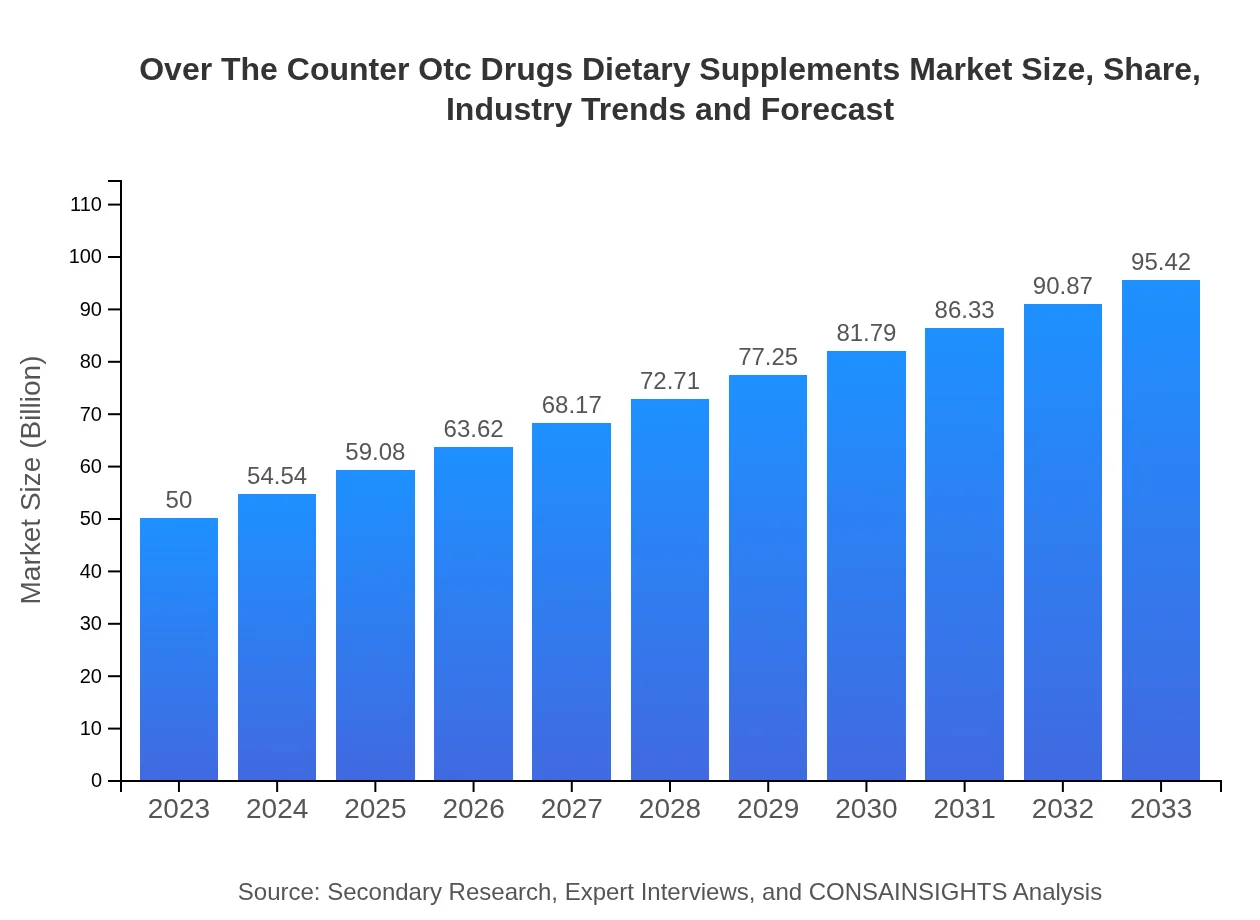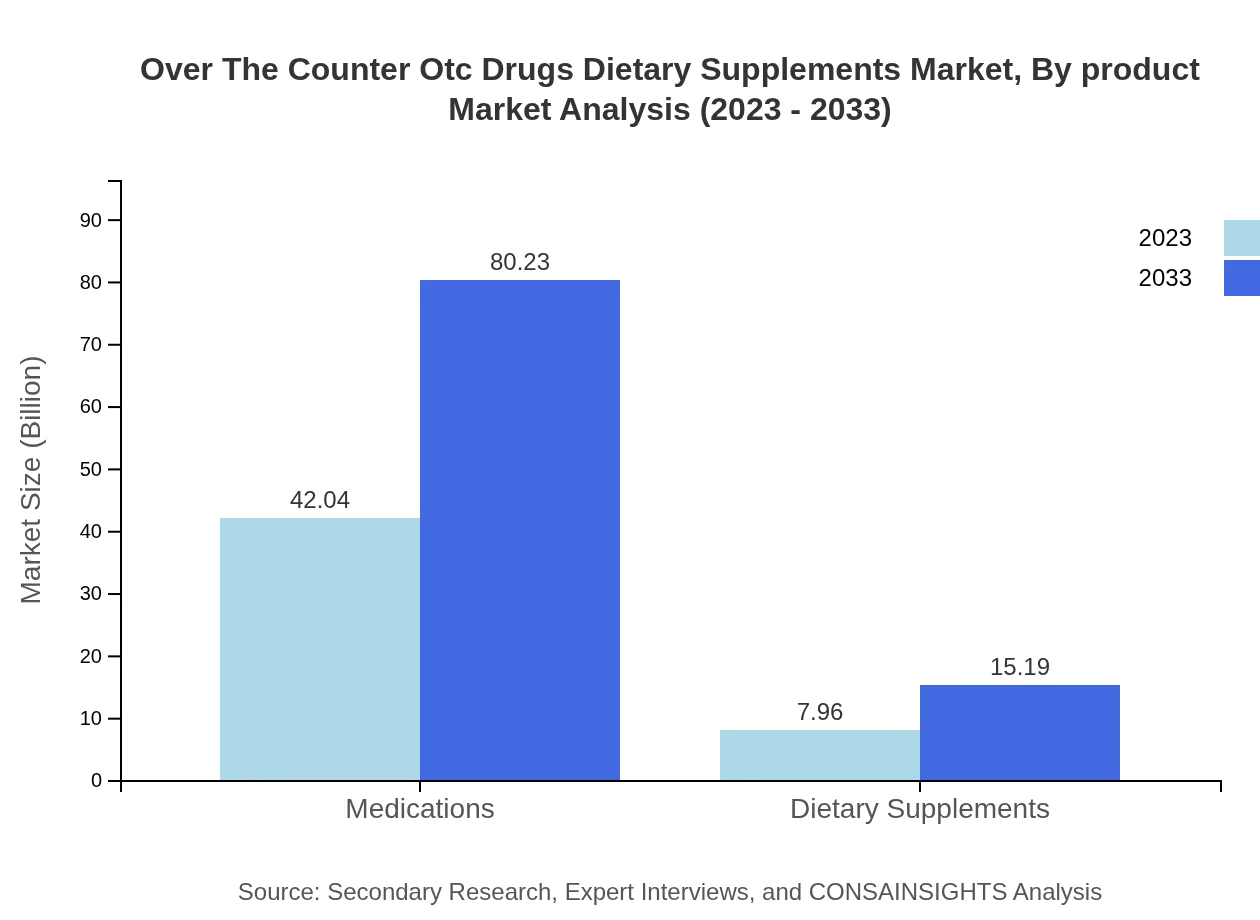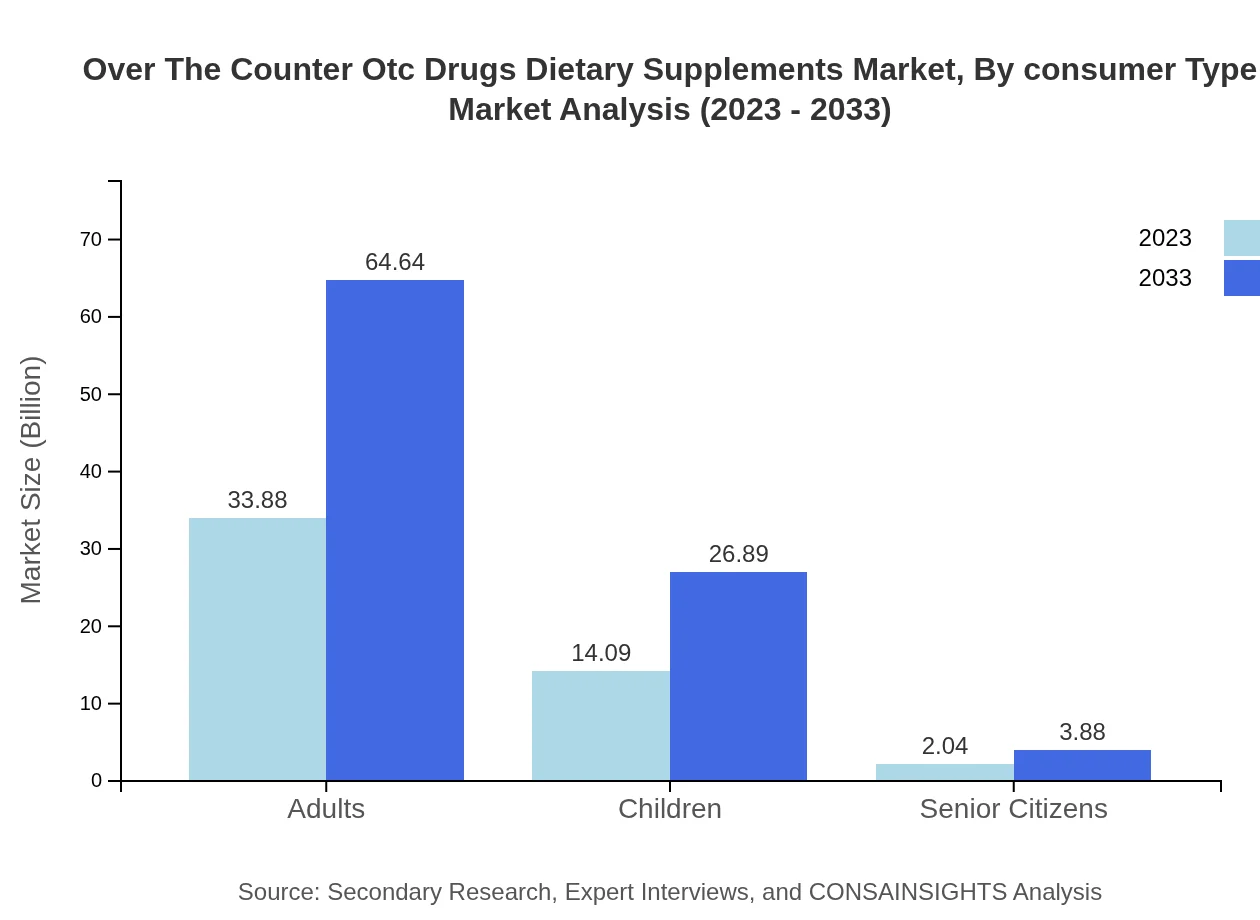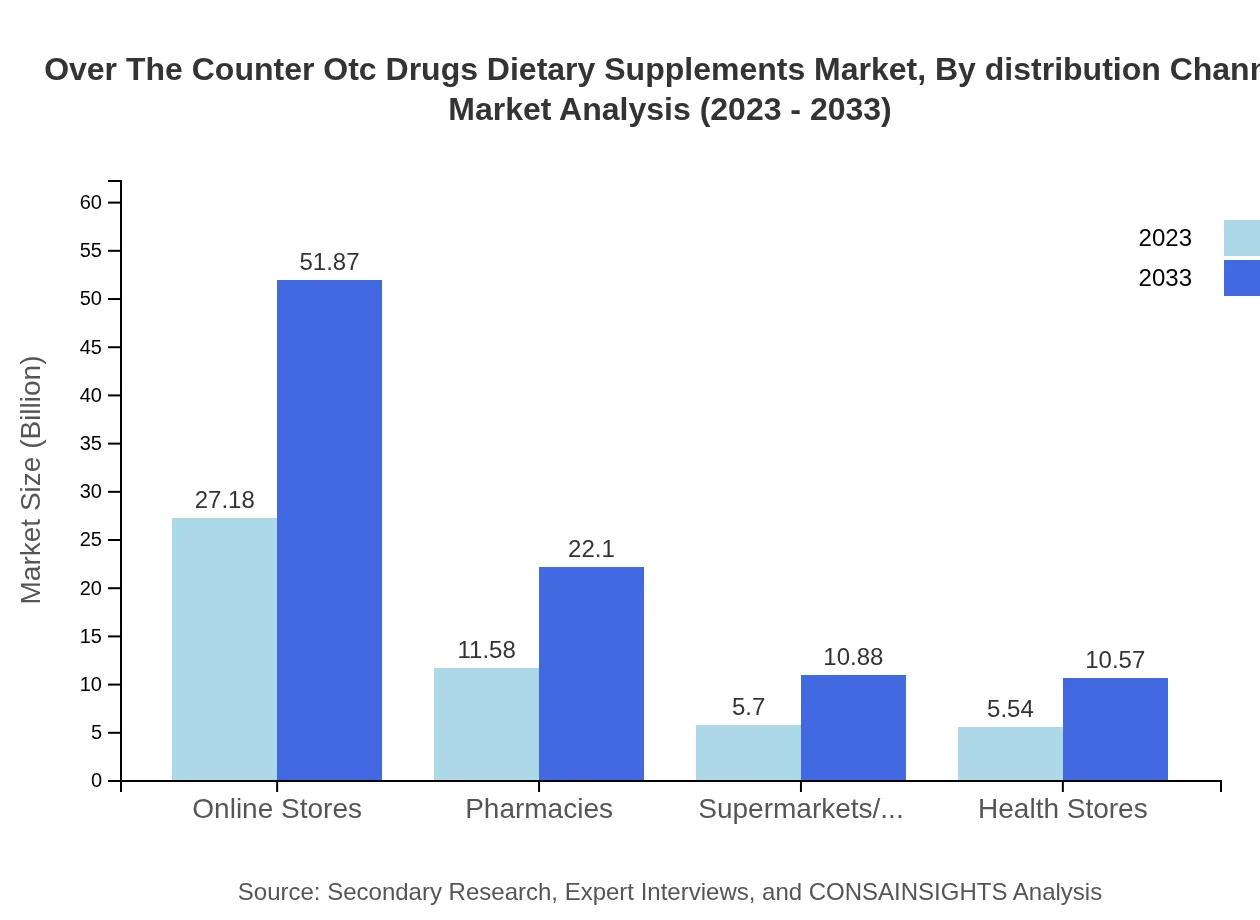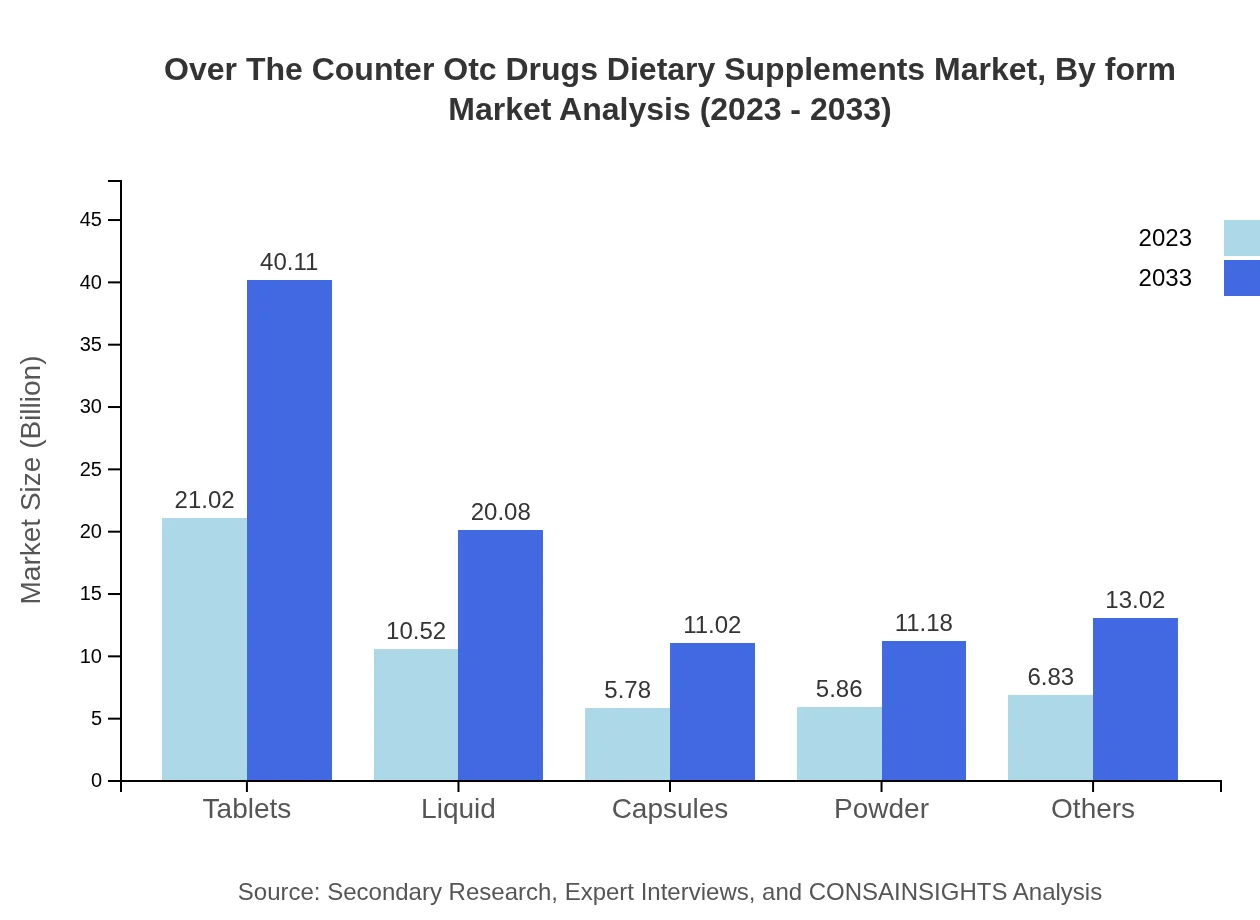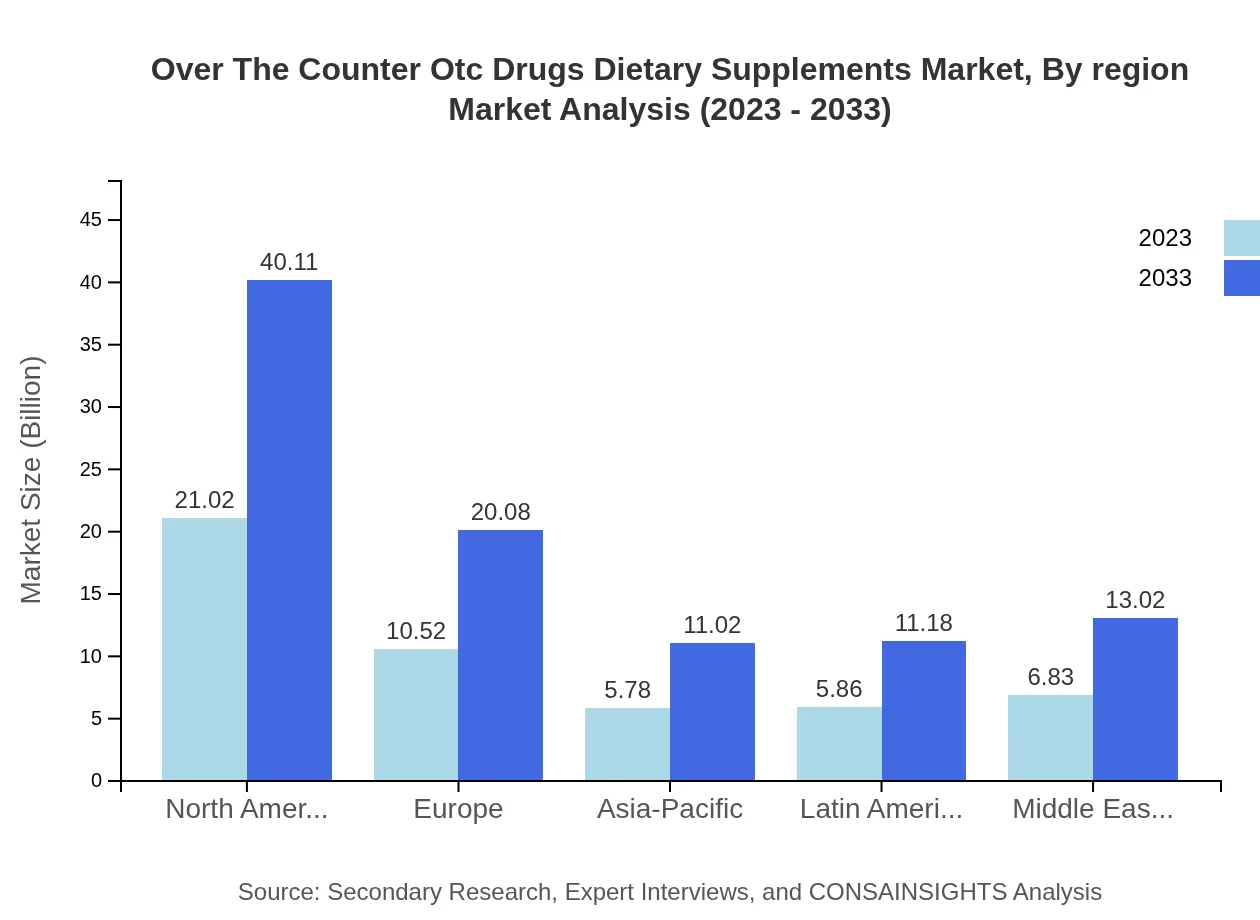Over The Counter Otc Drugs Dietary Supplements Market Report
Published Date: 31 January 2026 | Report Code: over-the-counter-otc-drugs-dietary-supplements
Over The Counter Otc Drugs Dietary Supplements Market Size, Share, Industry Trends and Forecast to 2033
This report analyzes the Over The Counter (OTC) Drugs Dietary Supplements market, providing key insights into market size, growth trends, segmentation, and competitive landscape. Insights are based on data for the forecast period from 2023 to 2033.
| Metric | Value |
|---|---|
| Study Period | 2023 - 2033 |
| 2023 Market Size | $50.00 Billion |
| CAGR (2023-2033) | 6.5% |
| 2033 Market Size | $95.42 Billion |
| Top Companies | Pfizer Inc., Johnson & Johnson, Bayer AG, GlaxoSmithKline plc, Nature's Bounty Co. |
| Last Modified Date | 31 January 2026 |
Over The Counter Otc Drugs Dietary Supplements Market Overview
Customize Over The Counter Otc Drugs Dietary Supplements Market Report market research report
- ✔ Get in-depth analysis of Over The Counter Otc Drugs Dietary Supplements market size, growth, and forecasts.
- ✔ Understand Over The Counter Otc Drugs Dietary Supplements's regional dynamics and industry-specific trends.
- ✔ Identify potential applications, end-user demand, and growth segments in Over The Counter Otc Drugs Dietary Supplements
What is the Market Size & CAGR of Over The Counter Otc Drugs Dietary Supplements market in 2023 and 2033?
Over The Counter Otc Drugs Dietary Supplements Industry Analysis
Over The Counter Otc Drugs Dietary Supplements Market Segmentation and Scope
Tell us your focus area and get a customized research report.
Over The Counter Otc Drugs Dietary Supplements Market Analysis Report by Region
Europe Over The Counter Otc Drugs Dietary Supplements Market Report:
In Europe, the market was valued at USD 15.55 billion in 2023, anticipated to expand to USD 29.67 billion by 2033. Factors such as the rise in self-medication, aging populations, and increased healthcare expenditures contribute to this growth.Asia Pacific Over The Counter Otc Drugs Dietary Supplements Market Report:
In the Asia Pacific region, the OTC Drugs Dietary Supplements market was valued at approximately USD 9.49 billion in 2023, with projections reaching USD 18.11 billion by 2033. The region is influenced by a growing middle-class population, increasing health consciousness, and a rise in chronic diseases, driving demand for accessible health products.North America Over The Counter Otc Drugs Dietary Supplements Market Report:
The North American market, valued at USD 17.46 billion in 2023, is projected to reach USD 33.33 billion by 2033. This region holds a significant market share due to established healthcare systems and a robust OTC drug regulatory framework facilitating product availability.South America Over The Counter Otc Drugs Dietary Supplements Market Report:
In South America, the market size in 2023 stands at approximately USD 2.65 billion, expected to grow to around USD 5.07 billion by 2033. The region's growth is supported by increasing disposable incomes and a shift towards preventive healthcare methods among consumers.Middle East & Africa Over The Counter Otc Drugs Dietary Supplements Market Report:
The Middle East and Africa market observed a value of approximately USD 4.84 billion in 2023, with expectations to grow to USD 9.24 billion by 2033. The region is experiencing growth transitions influenced by a combination of urbanization and rising health awareness.Tell us your focus area and get a customized research report.
Over The Counter Otc Drugs Dietary Supplements Market Analysis By Product
The OTC Drugs and Dietary Supplements market is primarily divided into two segments: medications and dietary supplements. In 2023, the medications segment accounted for a market size of approximately USD 42.04 billion, with projections suggesting it may grow to USD 80.23 billion by 2033, maintaining about 84.08% market share. Dietary supplements are on the rise as well, with a current value of USD 7.96 billion expected to increase to USD 15.19 billion by the forecast's end.
Over The Counter Otc Drugs Dietary Supplements Market Analysis By Consumer Type
The market segmentation by consumer type includes adults, children, and senior citizens. As of 2023, adults dominate with a market size of USD 33.88 billion. This is projected to increase to USD 64.64 billion by 2033, securing approximately 67.75% market share. Children and senior citizens have also contributed, with market sizes of USD 14.09 billion and USD 2.04 billion respectively, and strong projected growth.
Over The Counter Otc Drugs Dietary Supplements Market Analysis By Distribution Channel
Distribution channels encompass online stores, pharmacies, supermarkets/hypermarkets, and health stores. In 2023, online stores led with a market size of USD 27.18 billion, projected to reach USD 51.87 billion by 2033. Pharmacies significantly contribute, with current figures of USD 11.58 billion expanding to USD 22.10 billion, followed by supermarkets.
Over The Counter Otc Drugs Dietary Supplements Market Analysis By Form
Market segmentation by form includes tablets, liquids, capsules, powders, and other formats. Tablets currently represent a dominant form with a market size of USD 21.02 billion in 2023, growing to USD 40.11 billion by 2033. Liquid forms also show strong growth prospects, expanding from USD 10.52 billion to USD 20.08 billion.
Over The Counter Otc Drugs Dietary Supplements Market Analysis By Region
Regional performance indicates North America as a leading market, particularly for OTC drugs, followed by Europe and Asia Pacific. Each region presents unique growth drivers and competitive landscapes significantly influenced by local consumer preferences and regulatory frameworks.
Over The Counter Otc Drugs Dietary Supplements Market Trends and Future Forecast
Tell us your focus area and get a customized research report.
Global Market Leaders and Top Companies in Over The Counter Otc Drugs Dietary Supplements Industry
Pfizer Inc.:
A global leader in pharmaceuticals, Pfizer develops medications and dietary supplements, known for their strong R&D focus and extensive product portfolio.Johnson & Johnson:
A major player in the healthcare sector, Johnson & Johnson offers a wide range of OTC products, focusing on health and personal care.Bayer AG:
Bayer is a prominent global life sciences company, providing a wide array of OTC products and dietary supplements aimed at enhancing consumer health.GlaxoSmithKline plc:
GSK excels in developing a variety of OTC medicines and dietary supplements, emphasizing innovation and consumer-centric products.Nature's Bounty Co.:
Specializing in dietary supplements, Nature's Bounty is recognized for its commitment to quality and product efficacy in the health and wellness sector.We're grateful to work with incredible clients.









FAQs
What is the market size of Over The-Counter (OTC) Drugs and Dietary Supplements?
The Over-the-Counter (OTC) Drugs and Dietary Supplements market is currently valued at approximately $50 billion, with a projected CAGR of 6.5% from 2023 to 2033, indicating robust growth opportunities in this sector.
What are the key market players or companies in this OTC Drugs and Dietary Supplements industry?
Key players in the OTC Drugs and Dietary Supplements market include major pharmaceutical companies and health supplement brands that dominate global and regional markets. These companies focus on innovation and product diversification to maintain competitive advantages.
What are the primary factors driving the growth in the OTC Drugs and Dietary Supplements industry?
The growth of the OTC Drugs and Dietary Supplements industry is primarily driven by increasing health awareness, rise in self-medication trends, aging populations, and growing demand for preventive healthcare solutions among consumers globally.
Which region is the fastest Growing in the OTC Drugs and Dietary Supplements market?
The Asia-Pacific region is one of the fastest-growing areas in the OTC Drugs and Dietary Supplements market, projected to expand from $9.49 billion in 2023 to $18.11 billion by 2033, driven by rising health consciousness and improvement in retail channels.
Does ConsaInsights provide customized market report data for the OTC Drugs and Dietary Supplements industry?
Yes, ConsaInsights offers customized market report data tailored to the specific needs of clients in the OTC Drugs and Dietary Supplements industry, providing detailed insights and analyses to inform strategic decisions.
What deliverables can I expect from this OTC Drugs and Dietary Supplements market research project?
From this market research project, you can expect comprehensive reports including market size, growth forecasts, competitive landscape, regional data, segment analysis, and actionable insights to aid in strategic planning and investment decisions.
What are the market trends of OTC Drugs and Dietary Supplements?
Current market trends in OTC Drugs and Dietary Supplements include a shift towards online retailing, increasing demand for natural and organic products, and an emphasis on preventive health measures among consumers, signaling dynamic changes in consumer behavior.

